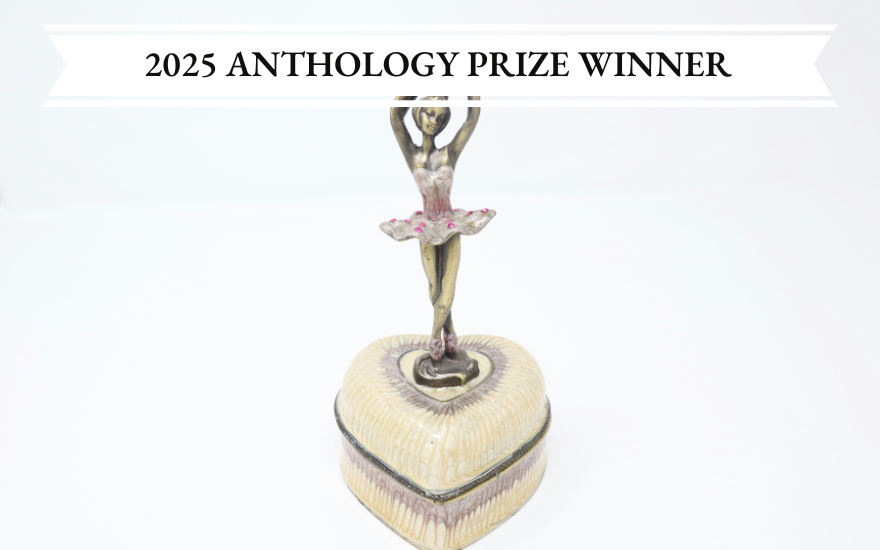
by Sascha Sizemore | Aug 26, 2025 | contest winner, flash fiction
One time, a porcelain doll lived within a music box. Beautiful, everyone who saw it said, pale skin and dark hair, raised en pointe with hands brushing the sky, forever dancing in an endless twirl.
The doll was fragile; everyone knew that, but no one paid much mind. It was safe inside its music box, feet floating above its stage, spinning in time with a shower of tinkling bells. It liked being like this, or so the crowd said, liked the safety and structure. The doll never had to question what it was to do; it simply had to dance.
One chilly morning, the doll’s foot slipped. It was nothing spectacular, just a simple accident. It fell as the crowd watched, between one heartbeat and the next, crashing down to hard ground, one of those eternally raised arms shattering as it took the force of the blow. The music box tinkled mockingly as the doll lay there, gasping, immobile, and staring down at where its arm had been until the bells fell silent.
–What do we do?
—I didn’t know it could fall.
–Get the creator.
And so the doll’s creator came, gathering up the frozen doll and all the shattered pieces of what had been. The creator took the doll to the kiln where it had been built and fired it anew, the pieces of the arm held together by molten metal. It hurt, but the doll did not scream. Not until it was back inside its music box and lifted its new white-gold arm above its head, preparing for another dance, and froze, stutter-stop still as the gold pulled and tugged, refusing to cede to anything but gravity.
—What are you waiting for? Dance, the creator demanded.
—I can’t. It hurts.
Mouth pressed into a sneer colder than the doll’s porcelain body, the creator turned away and started the music box again. The platform underneath the doll began to spin, and it was all it could do not to fall again, to lift its screaming golden arm and begin to twirl. But the doll obeyed. It knew nothing else. It wobbled, it shuddered, but it danced.
The next fall came two weeks later. Exhausted from fighting its arm, the doll lowered it and fell victim to its uncertain gravity, snapping both perfectly extended legs below the tutu. Again, the crowd called, and again the creator came, muttering expletives and snarling malice as the doll’s pieces were gathered up and returned to the kiln. This time, the doll screamed as gold was poured into its legs, as the gold in its arm burned in time with the crackles of the fire.
—Be quiet. I didn’t make you scream.
When the music box was again in sight, the doll tried to stand, but the lightning that tore up through its legs into the very core of it was too much, arms and legs throbbing in unison. The doll wanted to fold back down, to curl up like a wounded animal and breathe until the pain was gone. It knew that would be what those witnesses to its dance would do if they hurt like this, but the doll was not made to be one of them. It was made to entertain them. And so, painted face contorted into a grimace, it stepped back up onto the platform. It danced.
It danced, and the crowd watched, but they grumbled now. The doll didn’t look pretty with its face like that, with the tears beading in its eyes. The gold shining in its cracks glowed under the sunlight, but that served only as a reminder. It was slower now, cautious. No longer did its head lift towards the sky, ethereal, closer to flight than dance; it watched its feet carefully, determined not to slip. What is the point of this, they muttered among themselves. They were here for a performance, not a prayer.
The rock came from no one and everyone, flung from the crowd, anonymous and half-understood and inexorably, brutally real all the same. It hadn’t stopped, exactly, just slowed for a heartbeat to breathe. The missile caught the doll dead in the face in an explosion of ceramics and one haunting music note. Yet again, the crowd stood, grumbling, waiting for the show they had come to expect as the doll’s pieces were hauled away and it was brought back, thrashing, a mask of gold sealed over its once-beautiful face, moaning uselessly as it was deposited upon its stage.
The platform began to turn.

by Kay Nguyen | Aug 20, 2025 | contest winner, flash fiction
Cora couldn’t explain why she was baking a blackberry pie at three in the morning, even though she hated blackberry pie. She couldn’t explain why she dug into every cardboard box, searching for all her kitchen tools. She couldn’t explain why she tossed everything else aside, leaving the apartment a devastating mess.
Maybe because she’d just moved in a week ago.
Maybe because her mom unexpectedly passed a few days later.
Maybe because she’d spent all day planning her estranged mom’s funeral, because her dad was hysterical from the pain.
Maybe it was all of the above.
Cora couldn’t explain why she’d spent the last two hours looking for her mom’s old handwritten cookbook, frantically tearing through every box in a grief-fueled rage. She couldn’t explain why she’d never thrown it out, even though she hadn’t used it in almost a decade. She couldn’t explain why she kept it, even when her mom cut ties with her after Cora finally had the courage to come out.
Maybe because she couldn’t remember if the little hardcover notebook had a pink or red rose on the front.
Maybe because when she’d called all her mom’s contacts to notify them, she’d barely recognized half the names.
Maybe because she needed to ensure that page twenty-two wasn’t all made up in her head.
Maybe it was all of the above.
Cora couldn’t explain why her eyes welled up with tears when she found the cookbook at the bottom of the very last box. She couldn’t explain why her heart broke to see the cover stained and scratched, the pages stuck together and torn.
Maybe because it was the only thing she had left of her.
Maybe because of all the strangers who told her how blessed they were to know her mom.
Maybe because all her dad’s efforts to reunite them had gone to waste.
Maybe it was all of the above.
Cora couldn’t explain why she made the pie with the utmost care – carefully measuring each ingredient and following the recipe word for word. She couldn’t explain why she made the crust from scratch and checked every berry for imperfections. She couldn’t explain why she painstakingly latticed the dough on top, adjusting until it was absolutely perfect.
Maybe because page twenty-two had Cora’s Favorite – Mom’s Blackberry Pie written at the top in her mom’s beautiful cursive.
Maybe because, as the pie baked, she realized that not all their memories were painful ones.
Maybe because she remembered early mornings waking up to blueberry pancakes and late nights licking the brownie spoon.
Maybe because she never picked up any of her mom’s calls that had started coming in just last month.
Maybe it was all of the above.
Cora couldn’t explain why she watched the sun rise as she waited for the pie to cool. She couldn’t explain why her vision blurred when she realized it looked just like her mom’s in the golden morning glow. She couldn’t explain why she began to sob after taking the first bite.
Maybe because it was so delicious – tart, gooey, and warm.
Maybe because, long ago, she used to call her mom her best friend.
Maybe because she feared her mom had died, wondering if she still loved her.
Maybe because she never got the chance to tell she did.
Maybe because she realized her mom never stopped loving her either.
Maybe it was all of the above.
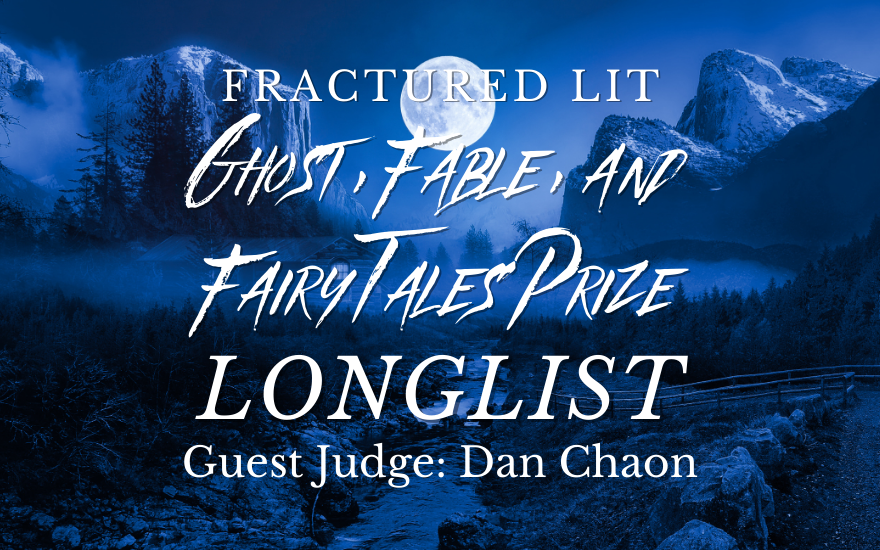
by Fractured Lit | Aug 20, 2025 | news
Congrats to all of our long-listed writers! Your story stood out to our readers and editors, and we’re excited to continue reading to find the perfect shortlist to send to Judge Dan Chaon!
Longlist:
- Temptation
- a white horse runs without its rider
- The Bureau of Exiled Ghosts
- Closed for the Season
- The Walker at Night
- Wolfie
- Bakunawa and the Seven Sisters
- Pinning a Soul
- Windows into the Solar System
- In the Hedgerow
- Reckoner
- Disenchanted
- Out of the Woods
- Just Right
- Kelpie
- Triple Body Walking
- Little Red Cap
- Pip
- Mercy
- Song
- The Ethics of Hematophagy
- What Light Through Yonder Window Breaks
- Some Vision of Horror
- My Mother the Sea
- The Hand
- Zen Lyrics for the Carhartt Guru
- Mother and Daughter
- Seed of the Starchild
- The Host
- Immortal Aubade
- The Ghost of No Regret
- Almalette
- The Tea Witch and the Heartless Gentleman
- The Return
- A Curse For The Merrow
- The 6:42 A.M. Caltrain from San Jose
- The Invisible Wild
- The Candles and Safe
- OWL FANTASMA
- One More Day to Stay
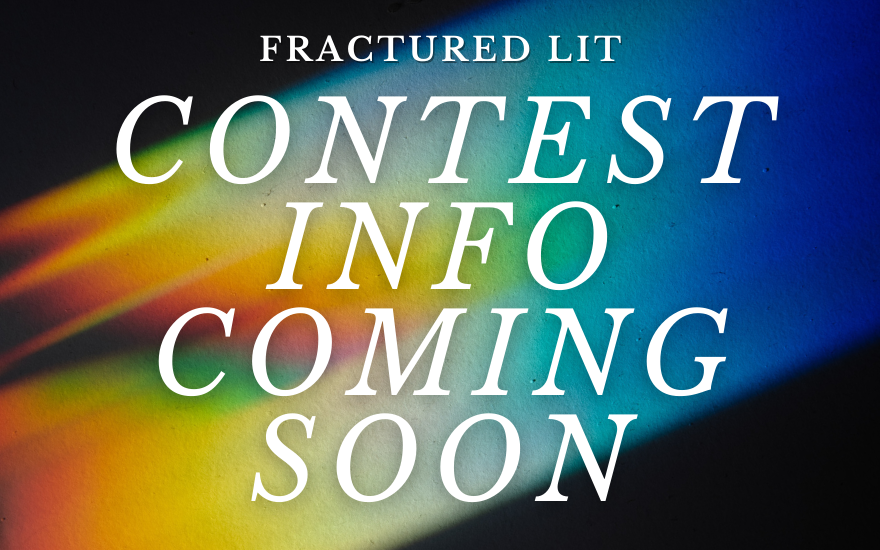
by Fractured Lit | Aug 20, 2025 | Uncategorized
AWARDING $3,500 + PUBLICATION
JUDGED BY JEMIMAH WEI
July 17 to September 14, 2025
Ready for the opportunity to turn reality on its head? We’re bringing back our Elsewhere Prize! We want those stories that make a mystery out of the ordinary, that make the rational out of the mystical. Play with the edge of genre, but make sure your character is still the star of your story. From July 17 to September 14, 2025, we welcome submissions to the Fractured Lit Elsewhere Prize.
“We are all strangers in a strange land, longing for home, but not quite knowing what or where home is. We glimpse it sometimes in our dreams, or as we turn a corner, and suddenly there is a strange, sweet familiarity that vanishes almost as soon as it comes.”
For this contest, we want writers to show us the forgotten, the hidden, the otherworldly. We want your stories to take us on journeys and adventures in the worlds only you can create; whether you make the familiar strange or the strange familiar, we know you will take us elsewhere. Be our tour guide through reality and beyond.
For this prize, we are accepting micro and flash fiction, so we’re inviting submissions of stories from 100-1,000 words.
We’re thrilled to partner with Guest Judge Jemimah Wei, who will choose three prize winners from a shortlist. We’re excited to offer the winner of this prize $3,000 and publication, while the second- and third-place winners will receive publication and $300 and $200, respectively. All entries will be considered for publication.
Good luck and happy writing!
In flash I seek the crystallized vision of a writer’s imagination — prose that understands intimately the tides of boldness and restraint, that isn’t afraid to venture into uncharted realities, emotions, and psychologies, yet never loses the thread of their story’s heart. Give me hitherto unmapped routes to familiar emotion, sentences that clarify and surprise, and a sense of the writer’s vision within and beyond the story’s limits.
Jemimah Wei was born and raised in Singapore and is now based between Singapore and the United States. She is a National Book Foundation 5 Under 35 Honoree, a winner of the William Van Dyke Short Story Prize, and a former Wallace Stegner Fellow at Stanford University and a Felipe P. De Alba Fellow at Columbia University. Her highly anticipated debut novel, THE ORIGINAL DAUGHTER, is a Good Morning America Book Club pick, a New York Times Editors’ Pick, and an IndieNext pick. It debuted at #1 on the Straits Times Bestseller list and has been named a best book of Spring 2025 by Harper’s Bazaar, Elle, Vogue, Apple Books, and more. A recipient of awards and fellowships from Singapore’s National Arts Council, Hemingway House, Sewanee Writers’ Conference, Bread Loaf Writers’ Conference, and Writers in Paradise, Jemimah’s writing has appeared in Joyland, Guernica, and Narrative, amongst others. She is presently a senior prose editor at The Massachusetts Review.
The deadline for entry is September 14, 2025. We will announce the shortlist within twelve to fourteen weeks of the contest’s close. All writers will be notified when the results are final.
OPTIONAL EDITORIAL FEEDBACK:
You may choose to receive editorial feedback on your piece. In your cover letter, please let us know which piece you’d like your editor to focus their review on. We will provide a two-page global letter discussing the strengths of the writing and the recommended focus for revision. Our aim is to make our comments actionable and encouraging. These letters are written by editors and staff readers of Fractured Lit. Should your story win, no feedback will be offered, and your fee will be refunded.
Guidelines
-
- Your $20 reading fee allows up to two stories of 1,000 words or fewer each per entry—if submitting two stories, please put them both in a SINGLE document.
- We allow multiple submissions—each set of two flash/sudden stories should have a separate submission accompanied by a reading fee.
-
- Please send flash micro fiction only—1,000 word count maximum per story.
- We only consider unpublished work for contests—we do not review reprints, including self-published work (even on blogs and social media). Reprints will be automatically disqualified.
- Simultaneous submissions are okay—please notify us and withdraw your entry if you find another home for your writing.
- All entries will also be considered for publication in Fractured Lit.
- Double-space your submission and use Times New Roman 12 (or larger if needed).
- Please include a brief cover letter with your publication history (if applicable). In the cover letter, please include content warnings as well, to safeguard our reading staff.
- We only read work in English, though some code-switching/meshing is warmly welcomed.
- We do not read anonymous submissions. However, shortlisted stories are sent anonymously to the judge.
- All AI-generated work will be automatically disqualified.
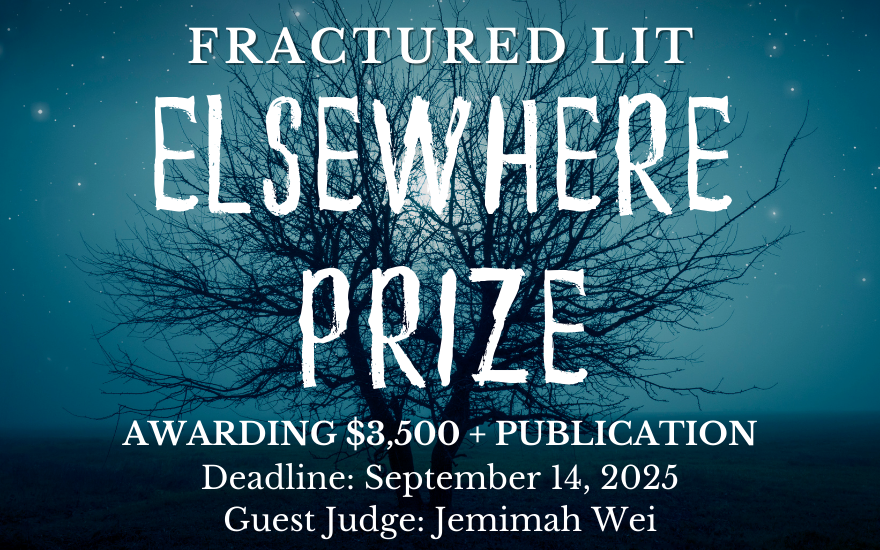
by Fractured Lit | Aug 20, 2025 | calendar, contests
AWARDING $3,500 + PUBLICATION
JUDGED BY JEMIMAH WEI
July 17 to September 14, 2025
(Closed)
Ready for the opportunity to turn reality on its head? We’re bringing back our Elsewhere Prize! We want those stories that make a mystery out of the ordinary, that make the rational out of the mystical. Play with the edge of genre, but make sure your character is still the star of your story. From July 17 to September 14, 2025, we welcome submissions to the Fractured Lit Elsewhere Prize.
“We are all strangers in a strange land, longing for home, but not quite knowing what or where home is. We glimpse it sometimes in our dreams, or as we turn a corner, and suddenly there is a strange, sweet familiarity that vanishes almost as soon as it comes.”
For this contest, we want writers to show us the forgotten, the hidden, the otherworldly. We want your stories to take us on journeys and adventures in the worlds only you can create; whether you make the familiar strange or the strange familiar, we know you will take us elsewhere. Be our tour guide through reality and beyond.
For this prize, we are accepting micro and flash fiction, so we’re inviting submissions of stories from 100-1,000 words.
We’re thrilled to partner with Guest Judge Jemimah Wei, who will choose three prize winners from a shortlist. We’re excited to offer the winner of this prize $3,000 and publication, while the second- and third-place winners will receive publication and $300 and $200, respectively. All entries will be considered for publication.
Good luck and happy writing!
In flash I seek the crystallized vision of a writer’s imagination — prose that understands intimately the tides of boldness and restraint, that isn’t afraid to venture into uncharted realities, emotions, and psychologies, yet never loses the thread of their story’s heart. Give me hitherto unmapped routes to familiar emotion, sentences that clarify and surprise, and a sense of the writer’s vision within and beyond the story’s limits.
Jemimah Wei was born and raised in Singapore and is now based between Singapore and the United States. She is a National Book Foundation 5 Under 35 Honoree, a winner of the William Van Dyke Short Story Prize, and a former Wallace Stegner Fellow at Stanford University and a Felipe P. De Alba Fellow at Columbia University. Her highly anticipated debut novel, THE ORIGINAL DAUGHTER, is a Good Morning America Book Club pick, a New York Times Editors’ Pick, and an IndieNext pick. It debuted at #1 on the Straits Times Bestseller list and has been named a best book of Spring 2025 by Harper’s Bazaar, Elle, Vogue, Apple Books, and more. A recipient of awards and fellowships from Singapore’s National Arts Council, Hemingway House, Sewanee Writers’ Conference, Bread Loaf Writers’ Conference, and Writers in Paradise, Jemimah’s writing has appeared in Joyland, Guernica, and Narrative, amongst others. She is presently a senior prose editor at The Massachusetts Review.
The deadline for entry is September 14, 2025. We will announce the shortlist within twelve to fourteen weeks of the contest’s close. All writers will be notified when the results are final.
OPTIONAL EDITORIAL FEEDBACK:
You may choose to receive editorial feedback on your piece. In your cover letter, please let us know which piece you’d like your editor to focus their review on. We will provide a two-page global letter discussing the strengths of the writing and the recommended focus for revision. Our aim is to make our comments actionable and encouraging. These letters are written by editors and staff readers of Fractured Lit. Should your story win, no feedback will be offered, and your fee will be refunded.
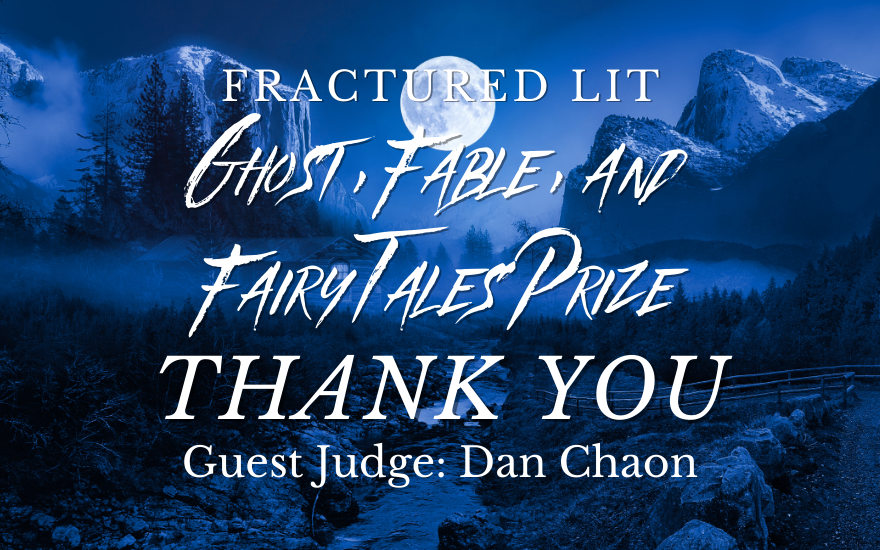
by Fractured Lit | Aug 20, 2025 | calendar, contests
Ghost, Fable, and Fairy Tales Prize
AWARDING $3,500 + PUBLICATION
JUDGED BY DAN CHAON
February 15, 2025, to April 13, 2025
We invite writers to submit to the Fractured Lit Ghost, Fable, and Fairy Tales Prize from February 15, 2024, to April 13, 2025.
We’re looking for stories that use flash fiction’s unique use of brevity and lyricism to create new twists on these familiar traditions. We want stories that take a slant approach, that create and illuminate the shadows, that awaken us to new ways of looking at our past and future; stories that scare us with their resonance, their attention to detail, and characters who get in and out of trouble. Don’t be afraid to use parts and pieces of all of these storytelling tropes and traditions in order to Frankenstein something never before seen. This contest produces some of the most imaginative submissions each year, and we look forward to reading your creations!
Guest Judge Dan Chaon will choose three prize winners from a shortlist. We’re excited to offer the winner of this prize $3,000 and publication, while the second- and third-place place winners will receive publication and $300 and $200, respectively. All entries will be considered for publication.
To me, flash fiction is not just a very short story or a poem in prose. It’s a unique form in its own right. Perhaps the closest corollaries are the koan and the riddle and the joke. Or the stiletto. The best flash fiction pierces you—it’s a stab, a slap, visceral and shocking, though “flash” doesn’t necessarily mean “flashy.” It may be as quiet as a barely exhaled final breath.
Dan Chaon’s newest book, One of Us, is forthcoming in October 2025. He is the author of seven previous books, including Ill Will, a national bestseller, named one of the ten best books of 2017 by Publishers Weekly. Other works include the short story collection Stay Awake (2012), a finalist for the Story Prize; the New York Times Best Seller Await Your Reply; and Among the Missing, a finalist for the National Book Award. Chaon’s fiction has appeared in the Best American Short Stories, the Pushcart Prize anthologies, and the O. Henry Prize Stories. He lives in Cleveland.





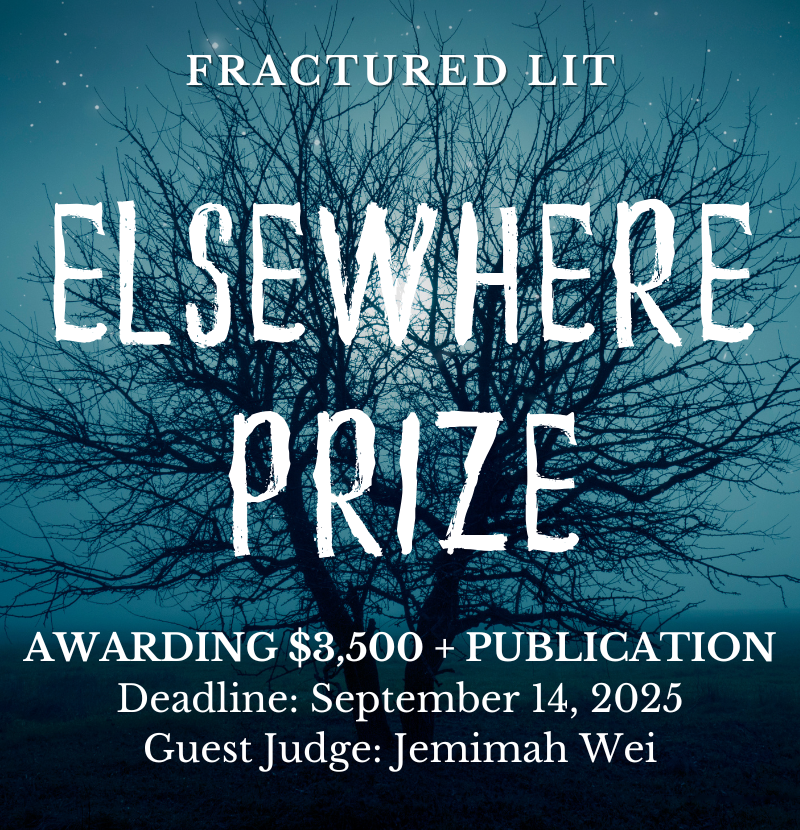



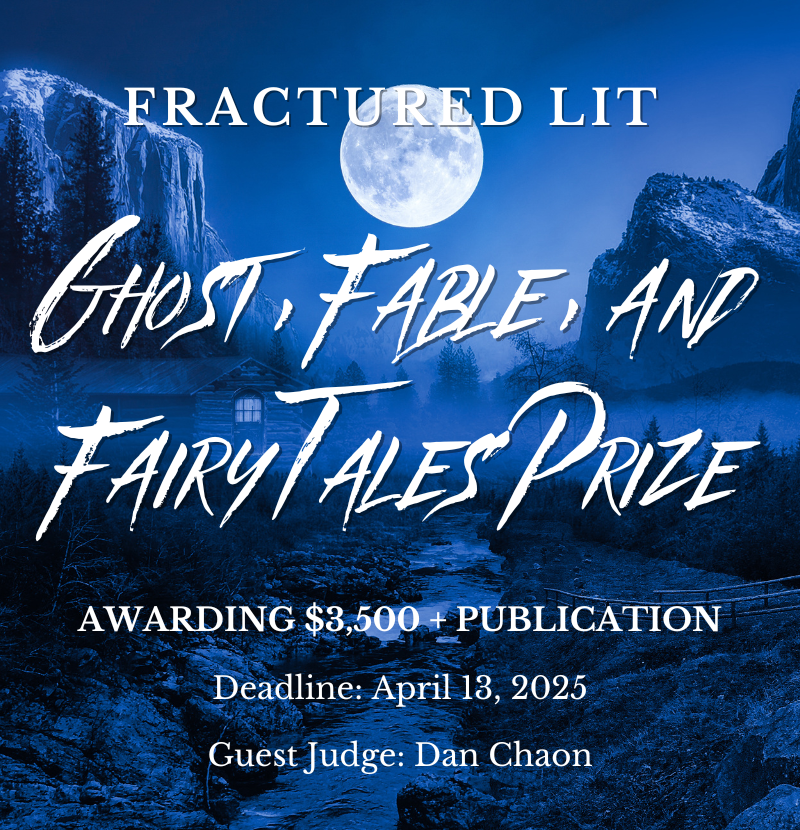

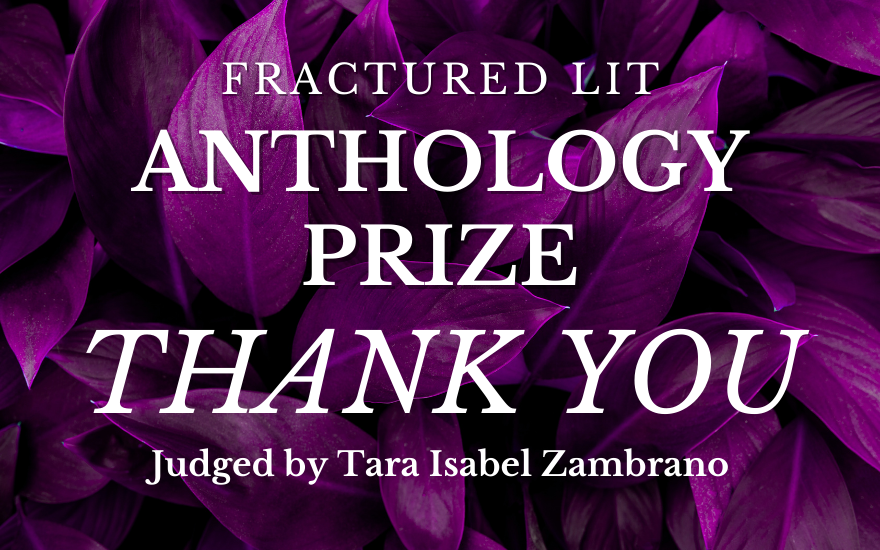
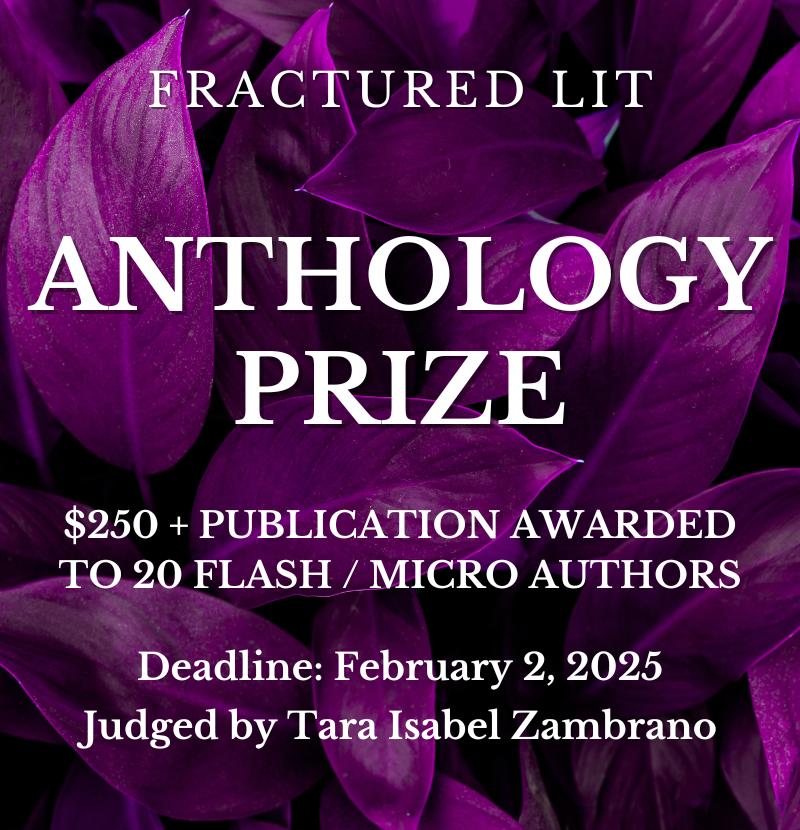

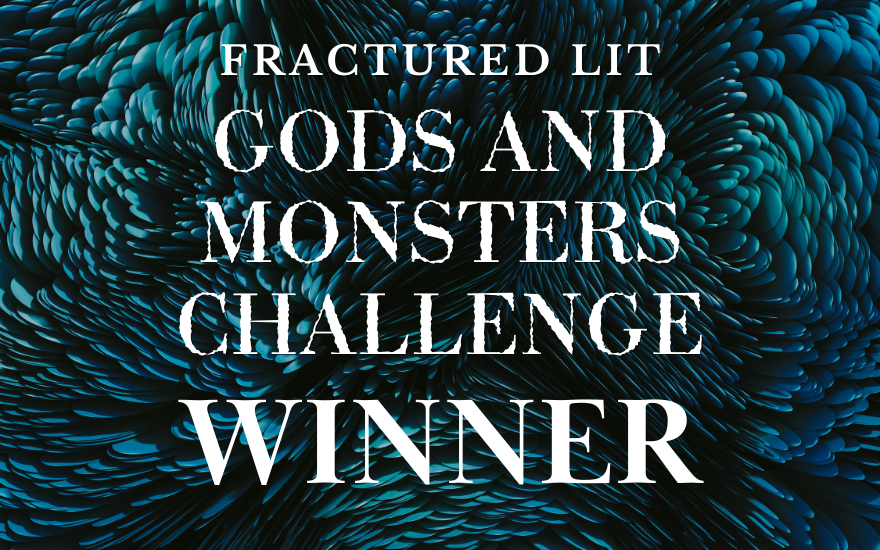


Recent Comments